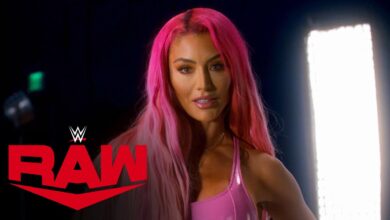Evolution Progress Report: Women Wrestlers On Effects Of Sexualization Of Female Athletes
Four female wrestlers from the independent circuit share their thoughts on how the sexualization of women athletes have affected their careers.
In attempt to gather another perspective on the progress of the women’s evolution, perception of female athletes is an important indicator, and must be measured. Four female wrestlers from the independent circuit speak out on how the depiction of female athletes have altered their careers, images, and perceptions.
It’s pretty well-known that, generally, female athletes are depicted in a more sexual manner than male athletes. Not only does academic research support that claim, but research also spells out how the sexualization of female athletes can affect multiple areas in the athlete’s professional career.
In “Images of Sports Women: A Review”, Emma Sherry, Angela Osborne, and Matthew Nicholson conducted an examination of scholarly research on the how media images construct specific attitudes towards, and perceptions of, women’s sport. In the article published in Apr. 2016 for Sex Roles, the authors described the low volume of media attention women in sport received, which included sexualized visual representations, along with a negative narrative focus, poor linguistic choices used, and the low prominence the women received in placement or scheduling.
The review revealed that media images of women in sport continuously fail to properly represent the realities of women’s performance in sport. They noted there was some decline in sexualization of female athletes, but they also note it’s likely due to a slight reduction in terms of volume.
Wrestler Mercedes Martinez agreed that sexualization of women wrestlers is clear and obvious.
“I definitely believe women are more sexualized in sports media. Everything we do, whether intentional or not, is sexualized in one way or another. The way we look, the way we talk, the way we move. We are programed to ‘behave’ like women when it comes to sports, but in reality, we are athletes and act as athletes,” said Martinez.
Ivelisse Velez agreed that women are more sexualized, but admits it’s getting better with time.
“It’s been this way for a long time. I’ve witnessed it, and experienced it, for a long time. There’s been lots of positive changes in the past few years, but there are still miles to go,” Velez noted.
Indie wrestler Shazza McKenzie claims women wrestlers are not only more sexualized, but are expected to be comparable to models.
“Men are expected to look like athletes, but women are expected to look like athletes and supermodels at the same time. As a female wrestler, when I was getting into the wrestling industry, the idea that I would have to do a bikini or swimwear photo shoot was just accepted, but no male wrestlers have these expectations put on them,” McKenzie stated.
NWA World Women’s Champion Allysin Kay argues that both male and female wrestlers have to deal with the outcome of over-sexualization, stating the real issue lies in the compensation.
“To be perfectly honest, one of my closest male friends in this business probably has me beat in the amount of dick pics he receives from fans on the regular. And on top of that, he has crazed female fans soliciting him in his inbox, as well. Of course, every individual is going to have their own experiences. But whether people are watching for our looks or our athletic ability, the bottom line is that the top women are not making as much as the top men, and that’s where I have an issue,” said the NWA World Women’s Champion
Kay brings up a fact many find frustrating: female athletes are paid less, despite the high level of objectification.
In 2006, Ann McGinley wrote “Urban Renewal: The Effects of Increased Sexualization on Women Workers”, which studied the long-term effects the common Vegas slogan “What happens in Vegas, stays in Vegas.” had on female employees within the city limits.
McGinley argued that the slogan added a more sexual and free-spirited nature to the city, which produced similar expectations from tourists.
The study concluded that the slogan’s effects included stricter and more gender- and sex-based dress and make-up policies for the women who had jobs that had no sexual content, and that the women experienced greater incidences of sexual harassment.
The women interviewed generally agreed that depiction of sexuality had affected their job in some manner, however small, sometimes making the job even harder.
McKenzie states that the trouble lies in the double standards sexualization can create.
“I think the biggest struggle, is that we’re expected to look like supermodels on top of the athletic part,” said McKenzie. “The hair, make-up, outfits are all these additional things that our male counterparts don’t have to worry about. When you’re in the business, as you get to a higher standard of the business, these expectations increase and there’s a lot more pressure to look a certain way for the predominantly male viewers.”
While McKenzie feels compelled to be uber-feminine, Velez said she finds herself playing down her femininity.
“I feel compelled and forced to downplay my femininity in order to thrive or be taken seriously. It’s not like it’s that much of a problem for me personally, as I am naturally a tomboy. But, from time-to-time I feel that sense of guilt or risk when having to decide how to dress. It a big reason I hate doing sexy photo shoots, too,” said Ivelisse.
So, how does one go about changing the sexualization of female athletes? It’s clear the perception is where the trouble lies. Media depiction of athletes is just one part of the story. How readers perceive athletes, and how those perceptions form judgments is where the industry can make active change for the better.
Two studies in particular that were found looked at the attitudes towards sexualized athletes.
J.B. Nezlek and his team of researchers conducted a study for The Journal of Social Psychology in 2010, titled “Gender differences in reactions to the sexualization of athletes”. In the study, participants rated a series of images that depicted well-known athletes, both male and female, in either a sexualized manner, or not.
The study found sexualized athletes were perceived more attractive, but as less competent, with the effects being greater for the female athletes, and from male participants.
Lisa A. Harrison and Ashley M. Secarea took the study further, with their article in the Dec. 2010 Journal of Sport Behavior, “College Students’ Attitudes Toward the Sexualization of Professional Women Athletes”. The study aimed to discover if “tawdry sexualizations” of women basketball players influence perceptions about gender-role orientation and the athlete’s athletic ability.
College students were given four bogus newspaper articles featuring a professional woman basketball player who was depicted in either a sexualized or non-sexualized manner. Status of the player was also manipulated by describing the athlete as “excelling” or “struggling” in her career.
The findings revealed when the athlete was depicted in a sexualized way, participants disapproved more of the high status athlete, and believed the athlete has less athletic ability than the low status athlete.
Bottom line, sexualization of a female athlete causes the viewer to judge the athlete’s ability, solely on their appearance.
The women interviewed were asked if they had ever been judged based on their appearance as a wrestler, and if they were blamed for pushing any stereotypes.
“I’m sure it has,” Martinez said. “I mean, I’m Puerto Rican, tatted up, female, and I’m a lesbian. I don’t publicly come out and say everything I am, because I don’t define myself by labels. I’m a woman, an athlete, a wife, a mom, a daughter, a sister, an aunt, a granddaughter, a cousin, a friend, etc. I learned to defy the odds and open my mouth when ignorance shows up.”
Velez was asked if she ever felt judged, and she shared that social media is partially to blame for the misjudgment.
“Unfortunately, of course, numerous times. But it is rather satisfying to prove them wrong or change their minds with my knowledge or performances,” Velez said. “I hate Social Media personally, I mostly use it for promoting my product. There are a lot of things I do not share on it to avoid dealing with that part where people go crazy misinterpreting and judging, etc. To each their own, you know?”
McKenzie stated that even the sheer fact that she was a woman caused trainers to falsely judge her athletic ability, and treat her differently when it came to training.
“When I began training, there were a lot of things that were brushed over as I would never need to learn to do them because I was female. I think as time goes on, that’s changing within the industry–certainly at places I train–but it’s definitely still an issue,” McKenzie said.
Kay makes the argument that everyone is judged, whether it’s consciously or not. The former Knockout shares a story of when she tried out for Impact, in 2016. At first, the person in charge “didn’t get” Kay on paper. When allowed to actually try out, the person allegedly admitted, “Okay, I get it,” and Kay was hired. She stated she felt fortunate enough to have the person change their initial judgment, but adds it’s not black and white.
“On the other hand, before that tryout, I changed my gear from a two-piece that I had been wearing on the indies for years, to the one-piece dress I wore for my first year in IMPACT, solely because I thought I wasn’t in ‘TV shape’. I have been fortunate enough to never have any serious body image issues, but I saw the women that the internet was calling ‘fat’, so I thought to myself, ‘Well if they are fat, I’m definitely too big to be wearing a two-piece.’ And that thought occurred to me so casually. I think that’s the saddest part. I didn’t have a breakdown about it, I don’t even remember feeling upset about it. I projected that sentiment without anyone telling me directly that I needed to dress a certain way, and it was directly due to my observation of others,” Kay said.
The issue of sexualization and the unfair depiction of women athletes is a deep-rooted issue that will only be fixed by time and a serious change in societal norms. The underlying sexism and assumption that women should use sex to sell, but that it will debunk them as serious athletes, is not something that can be undone by one article.
The very real effects of sexualization is the objectifying of women wrestlers. All too often, women are inappropriately groped at shows, slut-shamed, or harassed in public and on social media.
“Nobody has ever told me that I push female stereotypes,” adds Kay, “but I have been told things like, by men on Twitter, that I ‘shouldn’t dress like that’, or especially in my case, that I ‘shouldn’t talk like that.’ Which is actually where my signature ‘Pinkies Up’ derived from. Women are always told to act a certain way to be more ‘lady-like’; don’t swear, be dainty and delicate as to not scare away any potential suitors, etc. So, my thought process was, ‘Okay, you want me to be a lady? I’ll keep my pinky up, real classy-like, while I tell you to go fuck yourself.’”
The reality is, the industry has struggled with this issue since it’s conception. And while things are certainly better than before, there’s still so much that can be done. The stories of women wrestlers are important, and should be told to bring attention to the issues that still exist within the industry.
For Martinez, that means every woman takes control of her destiny, and refuses to be quiet when misperceptions happen.
“We, as females, have to set the boundaries, and support each other, and have each other’s back when the media wants to sexualize us in ways we don’t condone. We stand up for each other. At the end of the day, each person is their own. As long as they can look in the mirror without shame or regret for who they are, then the media will learn to take us for who we are. We aren’t just about the sex appeal,” Martinez closed. “We are more than that. I’m not of ashamed of who I am. I embrace it with all my flaws, because my flaws are what helps make me. The media will portray me in the light they want the public to see, but it’s up to me to change what the public sees and speak up.”



